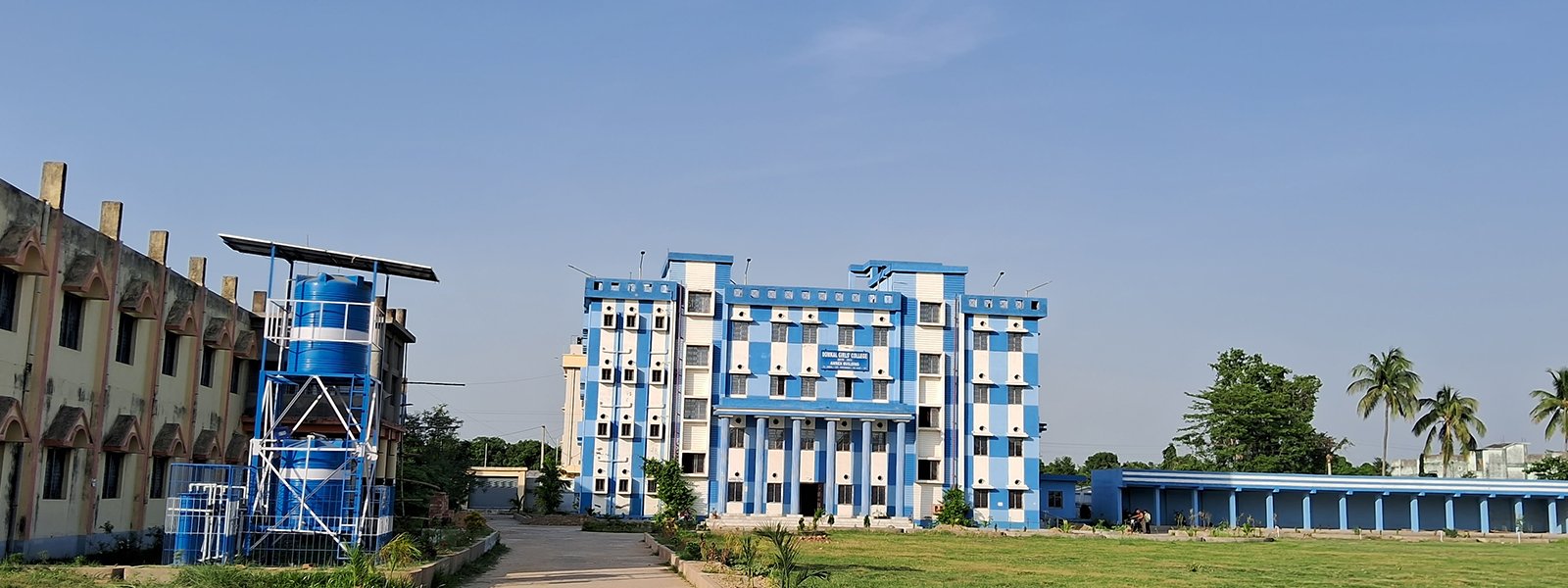Domkal Girls’ College
Recognised by the UGC u/s 2(f)
NAAC Accredited with Grade B+
AISHE ID: C-53416

DOMKAL GIRLS’ COLLEGE, a premier institution with a glorious distinction started its maiden journey in the quest for higher education for girls on 23rd February 2011 with the generous endeavors of Shri Anisur Rahaman,, Ex Minister Govt. of West Bengal, MLA of 75th Domkal Legislative Assembly and the key founder of the college. The institution located in the district of Murshidabad bears the rarest distinction of being the most sought- after Degree College for Girls in the district in the post-Independence era.
Since then, it has been an active gateway of higher education for the girls hailing from a motley combination of villages and towns like Bhat Jangle, Raninagar, Faridpur, Sarangpur, Jungida, Ramnagar, Katakobra, Kushaberia, Malatipur, Notial, Dhonirampur, Jalangi, Islampur etc to obtain their bachelor degree in Arts.
Leadership commitment and stakeholders’ participation are the fundamental hallmark of this institution. The faculty members tenaciously strive for professional development to impart advanced level of knowledge and holistic scholastic values to the students. The propitious physical infrastructure and human resource relentlessly promote ICT friendly teaching learning process and entrepreneurial ecosystem.
Parent Teacher Association, Alumni Association, multiple extra disciplinary clubs and forums work in tandem to implant academic attributes and humanistic values among the students. The institution also lays special emphasis on social work along with core academic activities to ensure a dynamic and sustainable student-neighborhood relationship.
Murshidabad, which was once the capital of undivided Bengal, Bihar and Orissa, is now the district only having the highest number of minorities in India and second highest percentage of minorities next to Udhampur. Also this district of West Bengal currently stands at the bottom in the area of education and culture due to insufficient educational infrastructure. omkal, which was merely a block out of 26 blocks in the district, has become a sub-division since 1999. It comprises of 4 blocks namely, Domkal, Jalangi, Raninagar-I & II across the border of the Bangladesh. The whole area of this youngest Sub-division is backward in all socio-economic parameters compared to other Sub-divisions. The literacy rate of woman is very poor. Even the scope of higher education was very limited. Considering the situation, the district administration decided to set up two Woman Colleges with the help of MSDP Funds (Rs. 10 core each) and the Government of West Bengal decided to establish the Colleges, one at Domkal and the other at Bhabta. Subsequently, Government of India informed that this fund cannot be utilized for such Colleges but only for Junior College (i.e. up to XII Class). The Minister and MLA of Domkal Shri Anisur Rahaman in that period along with other associated persons requested to the Minister-in-Charge, Higher Education, for sanctioning a Government aided College. The State Government agreed to the proposal and subsequently allotted 5 acres of land for this very purpose. The University of Kalyani accorded affiliation to the College in the month of 23rd February 2011. A part of the new building for the college has been constructed by the Organizing Committee with a cost of Rs. 2.5 crore. Apart from the small contributions from some local people and a contribution of Rs. 1.50 crore by a few members of Rajya Sabha like Mr. A.S. Malihabadi and Shri Shyamal Chakraborty towards the Building, local MLA (Ex-Minister) Shri Anisur Rahaman has provided more than Rs.70 lakh for the same. The College is running for the last 5 years with honours courses in Bengali, English, History, Education and Political Science. Hundreds of Girls have got admission since last 5 years. This College has come out as a light house of the higher education for the area in general and for the women in particular. Education is the backbone of the Nation. A society cannot develop without proper education for its womenfolk. Higher Education assumes more deciding and important part of this process of development of the women.